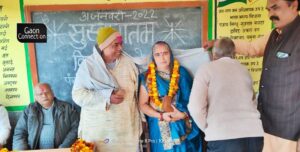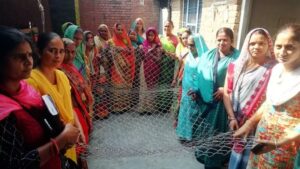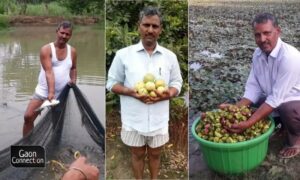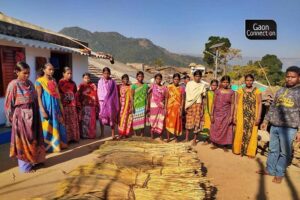Lakhimpur Kheri, Uttar Pradesh
Till six months ago, Radha Devi and her husband used to work as daily wagers, together barely earning Rs 400 a day. And in the pandemic, as the work dried up, they were finding it hard to feed their five kids.
Now Radha Devi alone earns Rs 400-600 a day. And the credit goes to a novel initiative that is underway in Samaisa village of Lakhimpur Kheri in Uttar Pradesh. Using discarded banana stems, the district administration is killing two birds with one stone — reprocessing crop residue and also providing livelihood to rural women.
“By converting the waste banana stems into fibre, I earn at least four hundred to six hundred rupees a day,” Radha Devi, a member of the Ma Saraswati self-help group (SHG) in Samaisa, told Gaon Connection. Like her, 39 more women in the village earn on an average Rs 400 a day through this enterprise.
Also Read: Water hyacinth gets a makeover as yoga mats
“Before, both my husband and I together would earn not more than four hundred rupees a day as daily wage labourers. When COVID happened the work dried up and we had no money to support ourselves and our five children,” 35-year-old Radha Devi, told Gaon Connection. “Now, I am able to support my entire family,” she added.
Waste banana stem to fibre
In Lakhimpur Kheri district, Uttar Pradesh, nearly 1,000 acres (405 hectares) of land is under banana cultivation. When the bananas are harvested, the farmers usually throw away the banana stem. Clearing the discarded stems from the field requires an additional spending of Rs 5 a quintal (1 quintal = 100 kilogrammes).
But not any more. Thanks to a unique initiative of the district administration, the discarded stems have become a source of employment to rural women who draw fibres from them. Banana fibres are largely used in textiles, slopes, hygiene products such as diapers, etc. The project was kicked off last December in Samesa village. What is more, the fibres are bio-degradable and therefore eco friendly.
Forty women from Samaisa were trained in extracting the fibres from the banana stems. “We bought machinery from a company in Gujarat and the same company imparted online training to the women,” Arvind Singh, chief development officer, Lakhimpur Khiri, told Gaon Connection.
“The Samaisa project was our first pilot project. Since it took off so well, we are going to scale it up, and replicate it in other villages too,” he said, adding that it would be part of a ‘One Block, One Product’ initiative.
“Ma Saraswati SHG has signed an MOU with AltMat, a company in Gujarat that transforms agriculture waste into natural fibres and yarns to be used in clothing and packaging. The company has placed an order for two hundred kilos of fibre to be delivered in 2022,” Arvind Singh said. According to him there are other orders of nearly 10 tonnes [1 tonne = over 900 kilos] of fibre from several companies. But the MOU is not yet signed, but will be once the banana harvesting gets underway in July.
This initiative has not only cut down the expenses of the banana farmers, but also augmented the income of women from the village, said the district officer.
Financial freedom to rural women
The project, which began in December 2020, in Samaisa village of Isanagar block, about 150 kms from the state capital, Lucknow, has brought financial freedom to village women who till recently were struggling to feed their children.
Radha Devi told Gaon Connection that each banana tree yielded about 100 grams of fibre, which can be extracted in 20 minutes.
“I leave home at about eight in the morning and on some days I even extract about nine to ten kilos of fibre,” she said.
For every kilogram of fibre extracted the women are paid Rs 100. On an average, one woman is able to extract at least four to six kilos of fibre a day, earning Rs 400-600. “The yarn is sold at anything between hundred eighty to two-hundred-fifty rupees a kilo,” said Radha Devi. “The women did not have to worry about finding buyers. Companies come to the village to collect the yarn,” she added proudly.
“I always wanted to study but could not do so out of poverty. But now, I have the confidence that my children will get the education I could never afford for myself,” she said with hope.
Many other rural women like Radha Devi are now employed, self-reliant and have a comfortable source of livelihood for themselves, even in the pandemic.
Going places
According to Arun Kumar Singh, the block development officer of Isa Nagar (Lakhimpur Kheri), there is already a demand for the banana yarns. “We have signed a Memorandum of Understanding with the textile company in Gujarat, and this has created a buzz of excitement amongst the women,” Arun Kumar told Gaon Connection.
“AltMat has already sent an advance amount of Rs 21,000 through RTGS (Real-Time Gross Settlement). We will set up more machines that will lead to more output and benefit the women,” he added.
CDO Arvind Singh also explained that they were using social media platforms to publicise Lakhimpur Kheri’s banana yarn. “We hope companies from India and abroad will come forward and invest in it, and help our villages progress further,” he said.
A graduate from the Indian Institute of Technology and Indian Institute of Management, Arvind Singh has several years of technical research experience in South Korea and Hong Kong under his belt.
Meanwhile, the women of Samaisa wait in anticipation. The next banana crop will be harvested in July and they are already planning to fulfil the huge order of 10 tonnes of fibre.



















